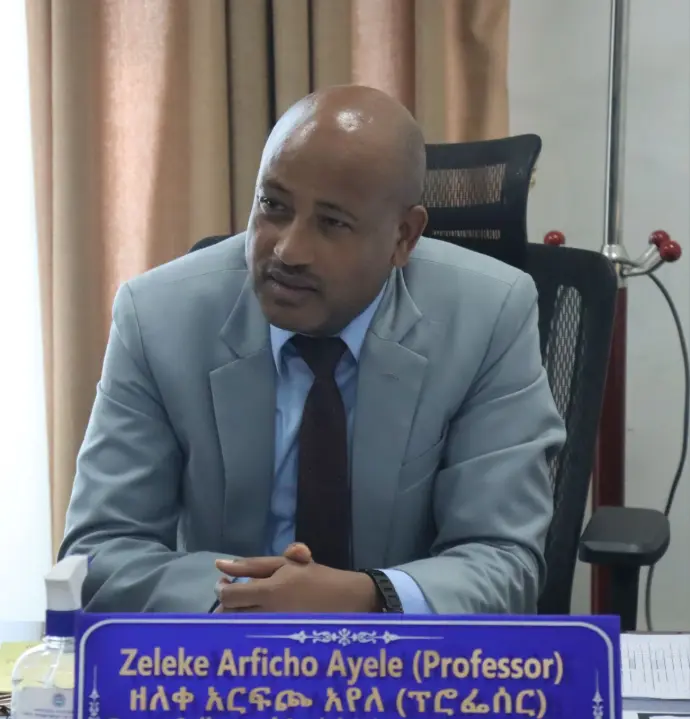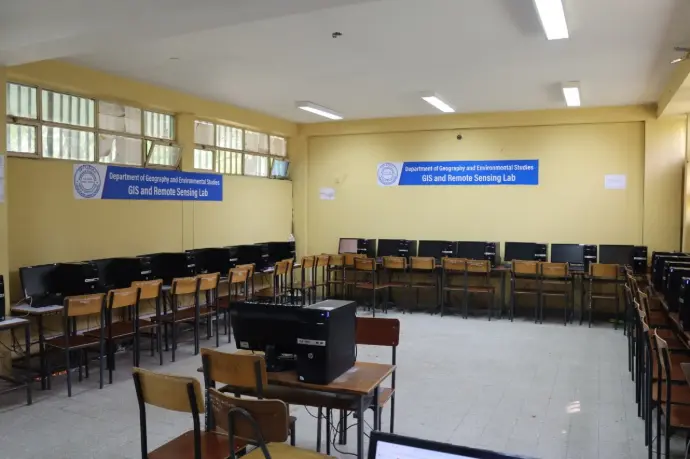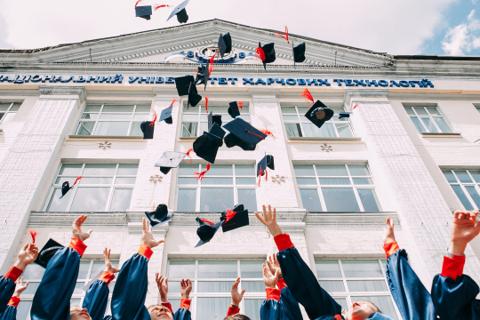Overview of the college
The College of Social Sciences and Humanities is equipped with a range of modern facilities that enhance teaching, learning, and research. These include the GIS and Remote Sensing Laboratory, the Digital Cartography Laboratory, two Journalism Laboratories, a Language Laboratory, and the Anthropology Resource Center. In addition, the College hosts the IELTS Center, the Student Guidance and Counseling Center, and several specialized libraries such as the Social Science Library, the Journalism and Communication Library (supported by the U.S. Embassy in Addis Ababa), and the ELIC Library. To further support innovation and interactive learning, the College also provides access to a state-of-the-art Smart Room.
Our program, with completion time included
The College of Social Sciences and Humanities at Hawassa University offers a diverse range of undergraduate and postgraduate programs across its departments, designed to equip students with both theoretical knowledge and practical skills. In Anthropology, students can pursue a B.A. in Anthropology (4 years regular, 5 years weekend/extension) or an M.A. in Social Anthropology (2 years regular, 2.5 years weekend/extension). The Department of English Language and Literature provides BA and B.Ed programs in English (4 years) alongside M.A. programs in Teaching English as a Foreign Language (TEFL) and Linguistics & Communication (2 years regular, 2.5 years weekend), as well as doctoral programs in English Language Teaching, Applied Linguistics and Communication, and Education in English (4–5 years). In Geography and Environmental Studies, students may enroll in BA and BEd programs (4 years regular, 5 years weekend/extension) or pursue M.A. programs in Population and Development Planning, Geography and Environmental Studies, and specialized tracks including Migration Studies, Disaster Risk Management and Climate Change, Regional and Urban Development Planning, Land Resource Management, Water Resource and Climate Change Adaptation, and Geospatial Information and Digital Cartography (2 years regular, 2.5 years weekend/extension).
The Department of Journalism and Communication offers a BA in Journalism and Communication (4 years regular, 5.5 years weekend) and an M.A. in Journalism and Mass Communication (2 years regular, 2.5 years weekend). In the Sidaamu Afoo and Literature Department, students can pursue BA and BEd programs (4 years regular, 5 years evening/weekend) as well as an M.A. in Teaching Sidaamu Afoo (2 years regular, 3 years weekend, 4 years summer). The Department of Sociology provides a BA in Sociology (4 years regular, 5 years weekend) and an M.A. in Sociology (2 years regular, 2.5 years weekend). Finally, the Theatre and Film Arts Department offers a BA program (4 years regular, 5 years weekend/extension) combining theoretical and practical training in acting, directing, playwriting, cinematography, and media production. These programs collectively prepare graduates for careers in research, teaching, public service, cultural institutions, media, and professional practice, while contributing to Ethiopia’s social, cultural, and environmental development.
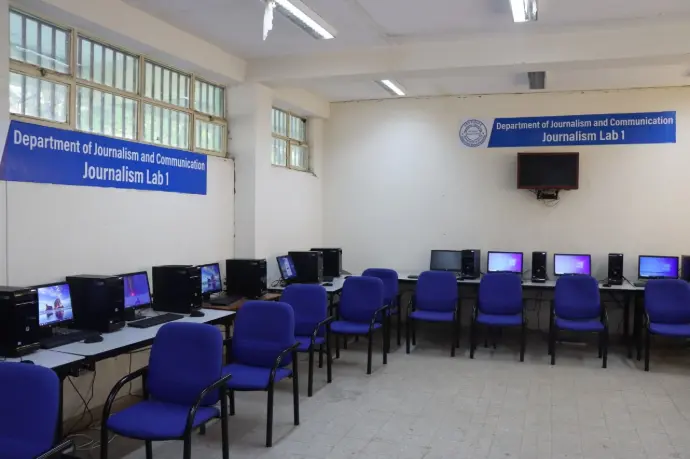
Journalism Laboratory
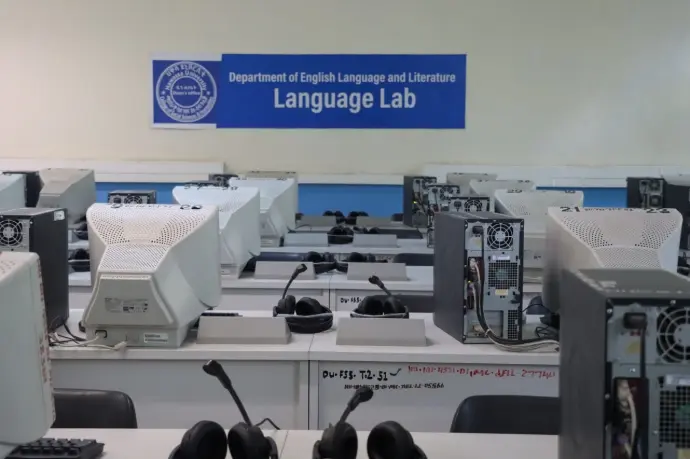
Language Laboratory

Chinese Laboratory
College of Social Sciences and Humanities in Number
2657 +
Total number of Students at the college.
122
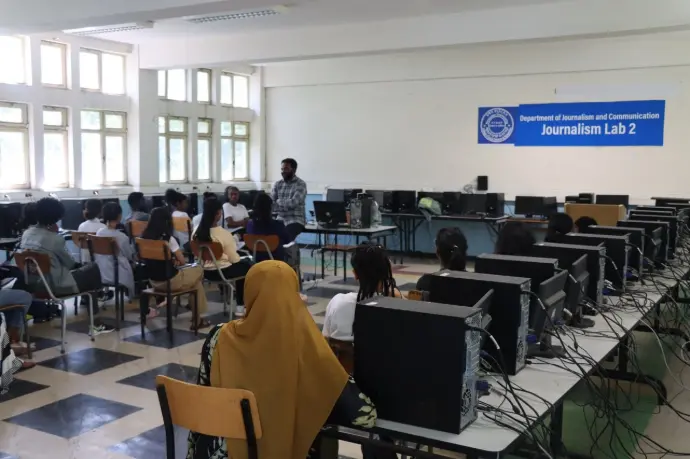
Total number of academic staff at the college.
03
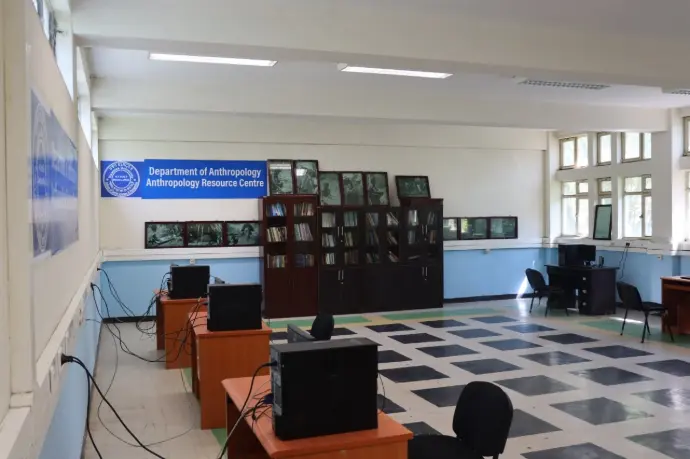
Total number of projects at the college.
139

Total number of publications since 2018.
Available Resources and Facilities
The College of Social Sciences and Humanities provides a variety of laboratories, workshops, and resource centres that serve students, staff, and the wider community. The Department of Anthropology, for instance, operates an Anthropology Resource Center that primarily supports both undergraduate and postgraduate students of the department. The centre offers access to a range of resources including anthropology-related books, research journals, Wi-Fi services, computers, and reading space. Beyond its role for students, it also serves academic staff, researchers from Hawassa University and other higher institutions, as well as members of the broader community. The Department of Journalism and Communication runs two well-equipped journalism laboratories. Journalism Lab I, located in Block 103, Room 02, provides facilities for practical sessions for journalism and communication students, offers specialised training on media and communication-related issues, and serves as a venue for online examinations, including the national exit exam and NGAT. Similarly, Journalism Lab II, located in Block 110, Room 201, provides the same range of services, giving students hands-on experience in their field while also supporting professional training and examinations. The Department of Geography and Environmental Studies also benefits from rich institutional resources that strengthen teaching, research, and experiential learning. Among these are the GIS and Remote Sensing Laboratory and the Digital Cartography Room, both of which equip students and staff with practical skills in spatial analysis, mapping, and data visualisation. In addition, the department takes full advantage of the region’s diverse natural, cultural, and historical resources, which provide invaluable opportunities for field-based learning and applied research.
The Department of English Language and Literature provides a wide range of laboratory and workshop services designed to enrich student learning while also serving the wider community. The Language Laboratory is equipped with modern audio-visual tools and language learning software that help students strengthen their listening, speaking, and pronunciation skills. It also offers practice sessions for standardised tests such as IELTS and TOEFL and provides targeted support for learners with speech difficulties. The Writing Workshop assists students in enhancing both academic and creative writing skills. Through essay-writing sessions, grammar support, peer-review activities, and guidance in literary composition, students develop strong communication abilities. The workshop also extends its services to the community by offering training for teachers and aspiring writers. The Literature Workshop promotes literary appreciation and engagement. It organizes book discussions, dramatic readings, and creative writing projects that bring together students, local authors, and community members in a shared celebration of literature. The Communication Skills Workshop is dedicated to building students’ public speaking and interpersonal communication abilities. Activities include debates, role-plays, interview skills training, and CV-writing sessions. The workshop also benefits the broader community by offering communication training for teachers, youth groups, and professionals. In addition to these laboratory and workshop services, the department actively engages in community outreach. It supports local schools through teacher training and the sharing of instructional materials, while also organizing adult literacy programs and evening English classes.
Libraries, Cafeteria, Clinic, and others
The Social Science Library at Hawassa University is a dedicated resource center that supports teaching, learning, and research in the fields of social sciences and humanities. It houses a rich collection of textbooks, reference works, academic journals, and digital resources that serve both undergraduate and postgraduate students, as well as faculty members and researchers. In addition to its extensive print and electronic collections, the library provides quiet reading spaces, internet access, and computer facilities that create an environment conducive to study and scholarly engagement. It also offers guidance in information literacy and research skills, helping students and staff to access, evaluate, and use academic resources effectively. The Social Science Library is not only a hub for academic work within the university but also extends its services to visiting researchers and members of the wider community, reflecting Hawassa University’s commitment to knowledge sharing and academic excellence.



Collaborations with prominent local and international institutions
The College of Social Sciences and Humanities actively fosters partnerships with leading local and international institutions, strengthening its global presence and creating opportunities for collaboration in teaching, research, and community engagement. The College has established Memoranda of Understanding with Vambo Academy in South Africa, the U.S. Peace Corps, and the British Council in Addis Ababa through both an IELTS Registration Agreement and a Property License Agreement. It also collaborates with Sakarya University in Türkiye, the International Oromo Cultural Institute (U.S.) together with the Finfinne Theater Association in Addis Ababa, and the Ethiopian-Chinese Language Education Network—founded by Addis Ababa University, the Federal Technical and Vocational Training Institute, and the Oromia Regional State Education Bureau—in partnership with the Chinese Embassy in Ethiopia. In addition, the College maintains strong ties with Mary Joy Ethiopia, the Global Peace Bank (a local civil society organization), and the Smart Edge English Language Professionals’ Association (SEELPA). Through these collaborations, the College continues to expand its international visibility and provide students and staff with broader academic and cultural opportunities.
